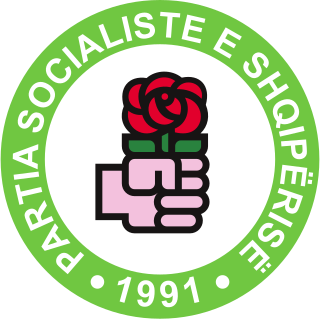Related Research Articles

The Kosovo War was an armed conflict in Kosovo that lasted from 28 February 1998 until 11 June 1999. It was fought between the forces of the Federal Republic of Yugoslavia, which controlled Kosovo before the war, and the Kosovo Albanian rebel group known as the Kosovo Liberation Army (KLA). The conflict ended when the North Atlantic Treaty Organization (NATO) intervened by beginning air strikes in March 1999 which resulted in Yugoslav forces withdrawing from Kosovo.

The Socialist Party of Albania is a social-democratic political party in Albania. It has been described as centre-left. It was founded on 13 June 1991. The PS is an associate of the Party of European Socialists and a member of the Socialist International, and holds pro-European views.

Pro-Europeanism, sometimes called European Unionism, is a political position that favours European integration and membership of the European Union (EU).

The Liberal Party of Kosovo is a liberal political party in the Republic of Kosovo.

The Democratic League of Kosovo is the oldest and one of the largest political parties in Kosovo.

Reformist Party ORA was a social-democratic political party in Kosovo. The party supported Kosovo independence.

The Alliance for the Future of Kosovo is a right-wing political party in Kosovo.
Bajram Kosumi, is a Kosovar politician who served as the third prime minister of Kosovo for nearly one year. He was nominated by Kosovan President Ibrahim Rugova and elected Prime Minister by the Kosovo Parliament on 23 March 2005 following his predecessor Ramush Haradinaj's. Kosumi resigned on 1 March 2006 amid widespread unpopularity and was replaced by former general leader Agim Çeku. He also served as the deputy chairman of the Alliance for the Future of Kosovo.

The Justice Party is a centre-right conservative political party in Kosovo.

The National Movement for the Liberation of Kosovo was a radical left-wing nationalist political movement in Kosovo during the 90s, as well as a political party after the Kosovo war.

The People's Movement of Kosovo was a political party in Kosovo active after the Kosovo War, having originally been founded as a political movement of Albanian nationalists in 1982. Despite participating in several elections in autonomous Kosovo, its pre-war existence was its most historically significant period. Historically, its support and membership came from Albanian diaspora, especially within Switzerland and Germany, originating mainly from former Yugoslav republics.
The politics of Kosovo takes place in a framework of a multi-party parliamentary representative democratic republic, whereby the President (Presidenti) is the head of state and the Prime Minister (Kryeministri) the head of government. Parliamentary elections are held every four years, the most recent in 2021.

Lëvizja Vetëvendosje (LVV) is a centre-left to left-wing political party in Kosovo. It is orientated towards principles of social democracy, populism, and Albanian nationalism.

Fatmir Sejdiu is a Kosovo Albanian politician. He was the leader of the Democratic League of Kosovo (LDK) and was the 1st President of Republic of Kosovo.

New Kosovo Alliance is a liberal political party in Kosovo. The party was founded on 3 May 2006, by Behgjet Pacolli.

Bamir Myrteza Topi is an Albanian diplomat and politician. He also was the president of Albania from July 2007 to July 2012.

Islam in Kosovo has a long-standing tradition dating back to the Ottoman conquest of the Balkans. Before the Battle of Kosovo in 1389, the entire Balkan region had been Christianized by both the Western and Eastern Roman Empire. From 1389 until 1912, Kosovo was officially governed by the Muslim Ottoman Empire and a high level of Islamization occurred among Catholic and Orthodox Albanians, mainly due to taxes levied only on non-Muslims and socio-political opportunism but also Ottoman retaliations and forced conversions. Despite these events, both Christian and Muslim Albanians intermarried and some lived as "Laramans", also known as Crypto-Christians. During the time period after World War II, Kosovo was ruled by secular socialist authorities in the Socialist Federal Republic of Yugoslavia (SFRY). During that period, Kosovars became increasingly secularized. After the end of Communist period religion had a revival in Kosovo. Today, 95.6% of Kosovo's population are Muslims, most of whom are ethnic Albanians. There are also Slavic speaking Muslims, who define themselves as Bosniaks and Gorani, and Turks.

The Serb List is a Serb minority political party in Kosovo. It was the dominant Serb party in Kosovo politics, claiming all ten of Assembly seats reserved for the community, from 2014 until all its members resigned and withdrew in 2022. The party retains close links to the Government of Serbia, led by the populist Serbian Progressive Party and President Aleksandar Vučić.

The Alternative is a liberal political party in Kosovo.
References
- ↑ "Incumbant President's Party Winning in Kosovo Municipal Elections - 2002-10-29". VOA. 2009-10-30. Retrieved 2023-09-01.